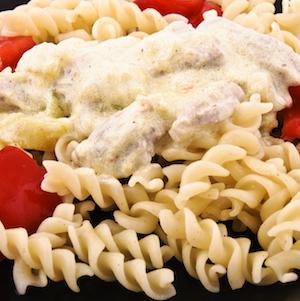Several years ago, during a layover in Copenhagen's airport, I struck up a conversation with an elderly British couple. The husband told me about growing up in the United Kingdom during World War II, when the British had implemented food rationing.
He recalls complaining to his mother that he didn't like the food they had to eat. She responded, in that "keep calm and carry on" manner that is so very British, "You don't have to like it. You just have to eat it."
Things have changed since then, not just in Britain but throughout Europe and in the United States. We now have so much food that we have the luxury of condemning most of it as impure or unhealthy. People can afford to pay a hefty premium at fancy outlets like Whole Foods (which still hasn't lowered prices much, despite Amazon's promise to do so), while looking down their noses at the riffraff who shop for groceries at Wal-Mart.
The Clean Food Mythology
One of the worst junk science trends in recent years is for grocery stores and restaurants to claim that they serve "clean food." (Panera Bread has become a somewhat recent high-profile offender.) Obviously, the not-so-subtle message is that everybody else is serving poison, so to be safe, you better eat their food.
For those devotees to the "clean eating" cult, there's even a new magazine -- creatively called Clean Eating -- that is dedicated to promoting a feel-good but pseudoscientific and unnecessarily expensive lifestyle.
What exactly is "clean eating"? The magazine includes a checklist, some points from which we will debunk:
Choose organic clean foods whenever possible. If your budget limits you, make meat, eggs, dairy and the Dirty Dozen your organic priorities.
There's nothing magical about organic food. Scientific research has definitively shown that it is not healthier, tastier, or more nutritious than conventional food. But it has fewer pesticides, right? Wrong. That's the biggest lie of all, and one that the Environmental Working Group loves to perpetuate with its Dirty Dozen list.
Get label savvy. Clean foods contain just one or two ingredients.
Really? Consider the humble cabbage. It contains at least 49 pesticides -- all of which are made by the plant itself. Even the organic ones.
Avoid processed and refined foods.
"Processed" is one of those vague terms that doesn't really mean anything. Literally, anything done to raw food can be considered processing, including washing or refrigerating it. Pasteurization, which prevents people from dying of foodborne infections from dairy products, is a type of processing. So is fortification, the addition of extra vitamins and minerals to food to prevent disease from nutrient deprivation. This sort of processing is a huge boost to public health, which is why Ross Pomeroy at RealClearScience argues that the world needs more processed food.
Avoid preservatives.
Preservatives keep food fresh longer. This helps prevent food waste, which is an enormous problem. For various reasons, such as an obsession with eating only pretty food, the U.S. throws out about half of its produce. How about we preserve it and feed poor people around the world, instead?
Eat produce that is seasonal and local. It is less taxing on your wallet and our environment.
Wrong and wrong. If all of our food was grown locally, the system would be incredibly inefficient, as described by Freakonomics. The author writes, "Today's high crop yields and low costs reflect gains from specialization and trade, as well as scale and scope economies that would be forsaken under the food system that locavores endorse." In other words, modern agriculture and basic economics have united to create a cheap, diverse, and abundant food supply that the local food movement could never emulate.
Likewise, there's no evidence that locally grown food is better for the environment. In fact, that's the biggest lie about local food. The reason, as Ross Pomeroy explains, is that production -- not transportation -- is the biggest driver of greenhouse gas emissions.
Clean Food Still Contains Cockroaches, Hair, and Poop
One more thing: No matter how sacred you think your food is, all food is imperfect. Animals live in and around our food. As a result, our food sometimes contains things like insect parts and rodent hair and poop. The FDA has set guidelines for how many "defects" various foods are allowed to contain. Peanut butter, for instance, is allowed less than 30 "insect fragments per 100 grams." Even the organic peanut butter.
It's well past time to put aside the snobbish notion that eating clean, local, organic food makes you a superior, healthier human.




